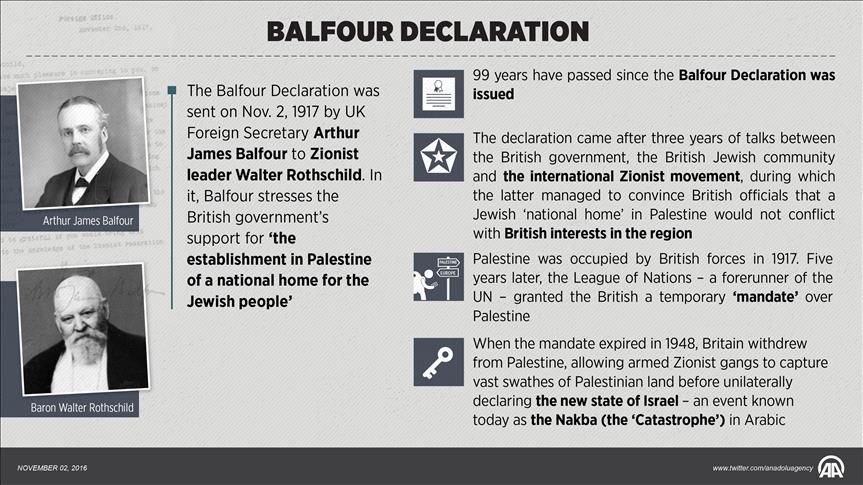99 years on, Balfour Declaration still elicits anger
Almost 1 century later, controversial British document still elicits Palestinian anger and demands for long-overdue apology

By Ola Atallah
GAZA CITY
Few documents in history have caused as much trouble as Britain’s 1917 Balfour Declaration, which this week celebrated its 99th anniversary.
In the declaration, dated Nov. 2, 1917, then-British Foreign Secretary Arthur Balfour tells Lord Lionel Walter Rothschild -- a leader of the Zionist movement at the time -- that the British government "views with favor the establishment in Palestine of a national home for the Jewish people".
The government, Balfour goes on to promise, "will use their best endeavors to facilitate the achievement of this object, it being clearly understood that nothing shall be done which may prejudice the civil and religious rights of existing non-Jewish communities in Palestine…"
The infamous declaration was the result of three years of talks between the British government, Britain’s Jewish community and the International Zionist Organization.
During those talks, the Zionists convinced British officials that their sought-for "national home" in Palestine would not conflict with British interests in the Middle East.
‘Those who don’t own’
Years later, after the Balfour Declaration and its contents became well-known, many in the Arab world -- especially in Palestine -- began referring to it as "the promise of those who do not own [i.e., the British] to those who do not deserve [i.e., the Zionists]".
The same year that the declaration was issued, amid the upheavals of the First World War, Palestine was occupied by the British army. Five years later, in 1922, the League of Nations -- a forerunner of the UN -- granted Britain a "mandate" to administer post-war Palestine.
In 1948, Britain withdrew from Palestine, allowing armed Jewish gangs to seize large swathes of the area, on which they swiftly declared the new State of Israel.
Until today, Palestinians refer to this episode -- in which hundreds of thousands of Palestinians were driven from their ancestral homes -- as the "Nakba", or "Catastrophe".
Some three quarters of historical Palestine were thus brought under Israeli control, while neighboring Jordan assumed control of the Palestinian West Bank and the Gaza Strip fell under Egyptian administration.
In the 1967 Middle East War, Israel occupied the West Bank as well, along with East Jerusalem, the Gaza Strip, Egypt’s Sinai Peninsula and the Syrian Golan Heights.
The 1993 Oslo Agreement between Israel and the Palestinian Liberation Organization granted the Palestinian leadership -- in the form of a newly-minted "Palestinian Authority" -- semi-autonomy in parts of the West Bank.
According to a 2015 report by the official Palestinian statistical agency, Israel now controls a whopping 85 percent -- or some 27,000 square kilometers -- of historical Palestine.
-‘Worst tribulations’
In September of this year, speaking before the UN General Assembly, Palestine's President Mahmoud Abbas called on Britain to "apologize" for the Balfour Declaration, which, he said, was the source of decades of Palestinian suffering.
Abdul-Sattar Qassem, a political science professor at the West Bank’s Birzeit University, believes that the Palestinian people suffered their "worst tribulations" in the nearly 100 years since the Balfour Declaration was issued.
"What the Palestinians are going through now is a direct result of this ‘promise’, which ushered in a new phase of injustice and allowed Israel to appropriate our land and holy places," Qassem told Anadolu Agency.
"For almost ten decades," he said, "the international community has not treated justly with the Palestinians and has utterly failed to provide a solution to our suffering."
He added: "The Judaization of Jerusalem continues apace; Jewish settlement-building [on Palestinian territory] goes on; and land confiscations remains commonplace. All this can be traced back to Balfour."
Empty promises
Adnan Abu Amer, head of the press and information section at the Gaza Strip’s Al Ummah University, said Palestine had experienced more than one Balfour Declaration -- in the form of numerous empty promises -- over the course of the last century.
"Israel continues to steal Palestinian land with impunity while the Arab world remains impotent to stop it," he told Anadolu Agency.
"Everything that is happening in the region today helps Israel continue its policy of denying the Palestinians their basic rights," he said.
"In recent decades, Israel has steadily become more aggressive, taking advantage of Arab weakness and the support it enjoys from world powers," he added.
In December of 2014, Washington used its veto right at the UN Security Council to derail an Arab draft resolution that called for ending Israel’s decades-long occupation by the end of 2017.
On Wednesday, Palestinians marked the Balfour Declaration’s 99th anniversary with angry protests in both the Israeli-occupied West Bank and the Israeli-blockaded Gaza Strip.
Protesters raised Palestinian flags and banners calling on the British government to apologize to the Palestinian people for the fateful declaration and its wide-ranging consequences.
And on Friday, dozens of Sudanese demonstrators -- along with several members of the local Palestinian community -- protested outside the UN’s office in Khartoum to denounce the 99-year-old declaration.
Anadolu Agency website contains only a portion of the news stories offered to subscribers in the AA News Broadcasting System (HAS), and in summarized form. Please contact us for subscription options.







